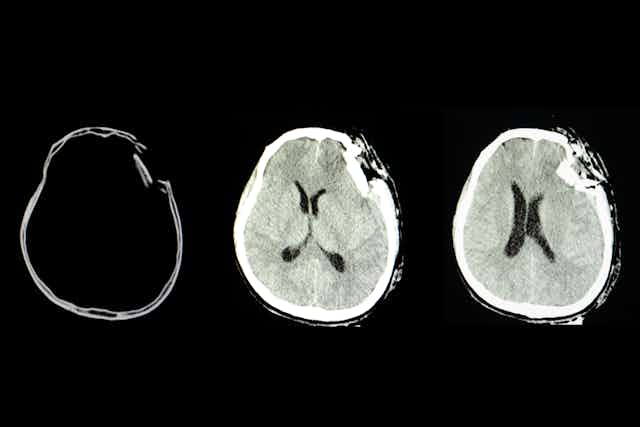People with traumatic brain injuries are more likely to be violent, more likely to go to prison at a younger age (and have multiple convictions) and more likely to disobey prison rules. They are also more likely to abuse alcohol and drugs, more likely to have mental health problems and more likely to attempt suicide. Surprisingly, given the vast range of negative outcomes for this type of trauma, there have been few studies on brain injury among female prisoners.
We have tried to address this lack of information with our latest research which we recently presented to parliament.
Given that brain injury is more common in the prison population than it is in the general public and given the many negative outcomes associated with it, you might think that it would be in the interests of prison administrators to identify, treat and manage brain injury to reduce the risk of future offending. Yet the impact of brain injury on how someone responds to imprisonment, including rehabilitation, has not been a focus of prison services.
Most people in prison are men and most of what we know about brain injury among prison populations is based on men, such as the cause (commonly through fights) and the impact on brain functioning following injury. But female inmates have higher rates of repeated brain trauma than men, often as a result of being victims of partner violence.
The different ways that men and women receive brain injuries might mean that the injury impact differs, but we don’t know enough about this yet. In one study, women reported frequent problems with anxiety, depression and sleep, whereas men complained of problems with concentration and feeling irritated or annoyed. This suggests that the focus of rehabilitation and skills development following traumatic brain injury, may need to be different for men and women.

HMP Drake Hall
The Brain Injury Linkworker Service provides specialist support to women with brain injury so that prisoners can make the best use of their time in prison and cope better when released from prison. The Disabilities Trust, the charity that runs the service, asked us to evaluate the intervention and make recommendations for working with women at HMP Drake Hall in England. We wanted to understand staff awareness of brain injury, and what assessment and support prisoners received. To this end, we interviewed 11 prison staff in different roles, as well as 14 prisoners.
We found that the women needed education and support for their mental health and brain injury. Before contact with the service, many women did not know that they had a brain injury and that this would have accounted for some of their problems with managing daily activities and getting on with other people.
Although some women received hospital treatment for their head injuries, they did not then receive the rehabilitation required to manage the impact of these injuries, such as problems with thinking and memory. These findings are worrying because the women also reported serious problems with anxiety and depression.
The women reported harrowing accounts of emotional trauma, adversity and severe violence and sexual abuse in their lives. Most of the women had not received professional help for these experiences and this made it very difficult for them to let anyone know about their brain injuries, which were often caused by violence.
The problems these women experienced were made worse by the prison environment. For example, prison officers did not know about brain injury and some did not realise that disobeying prison rules and instructions might be due to problems with thinking and memory rather than acts of defiance. So the women got into trouble and this sometimes increased their distress.
We found that when the women talked to the service about the cause of their brain injury and learned skills to manage the impact of this, they felt understood and felt better about themselves. It also resulted in them feeling more positive and less anxious and depressed. This is important because this might mean that they would be more able to engage in rehabilitation efforts to reduce risk of reoffending.
The prison staff we interviewed said that they would benefit from training in brain injury so they can support women with these injuries in prison. More support for women with brain injury might prevent them from becoming victims of abuse again and leave them less likely to re-offend.

